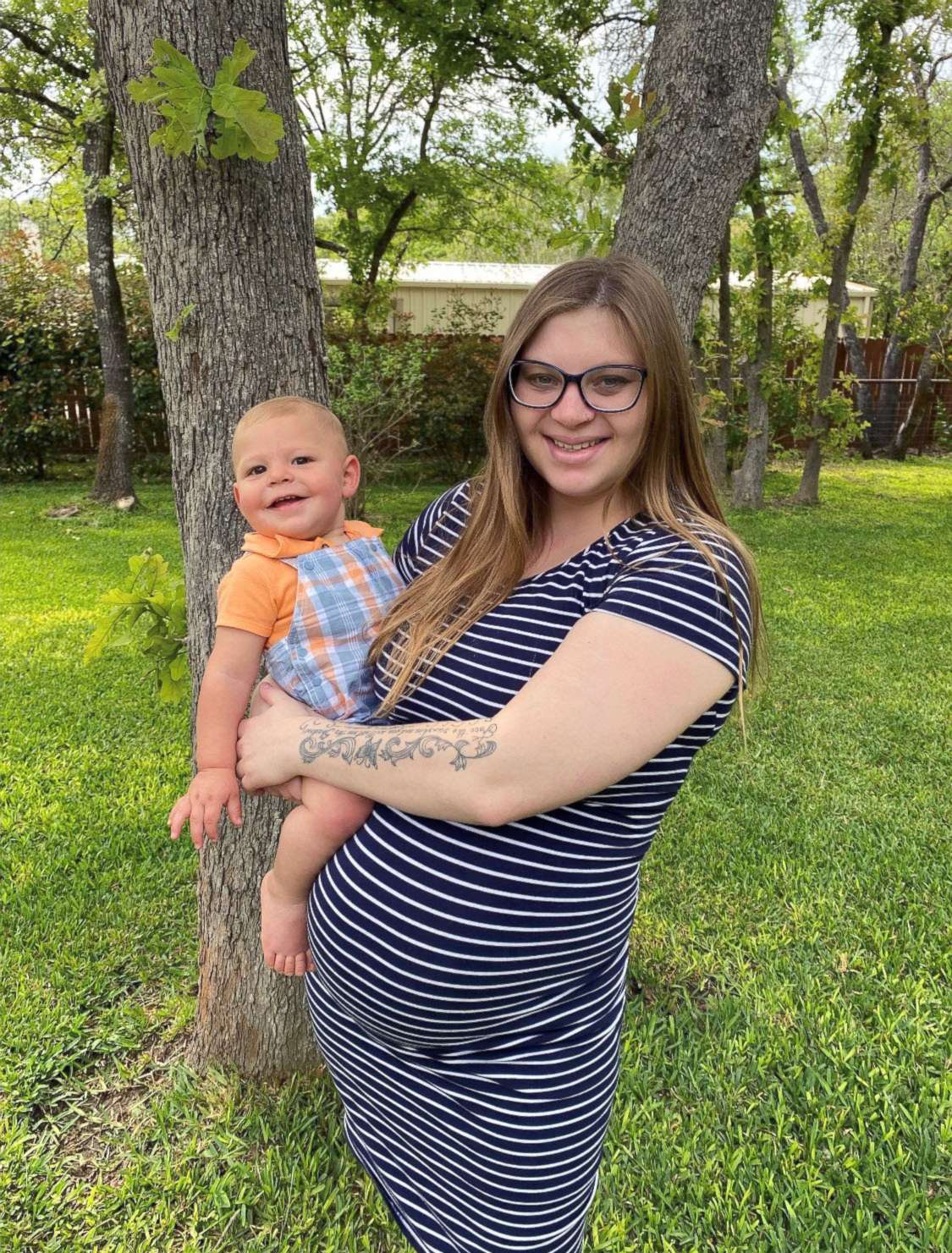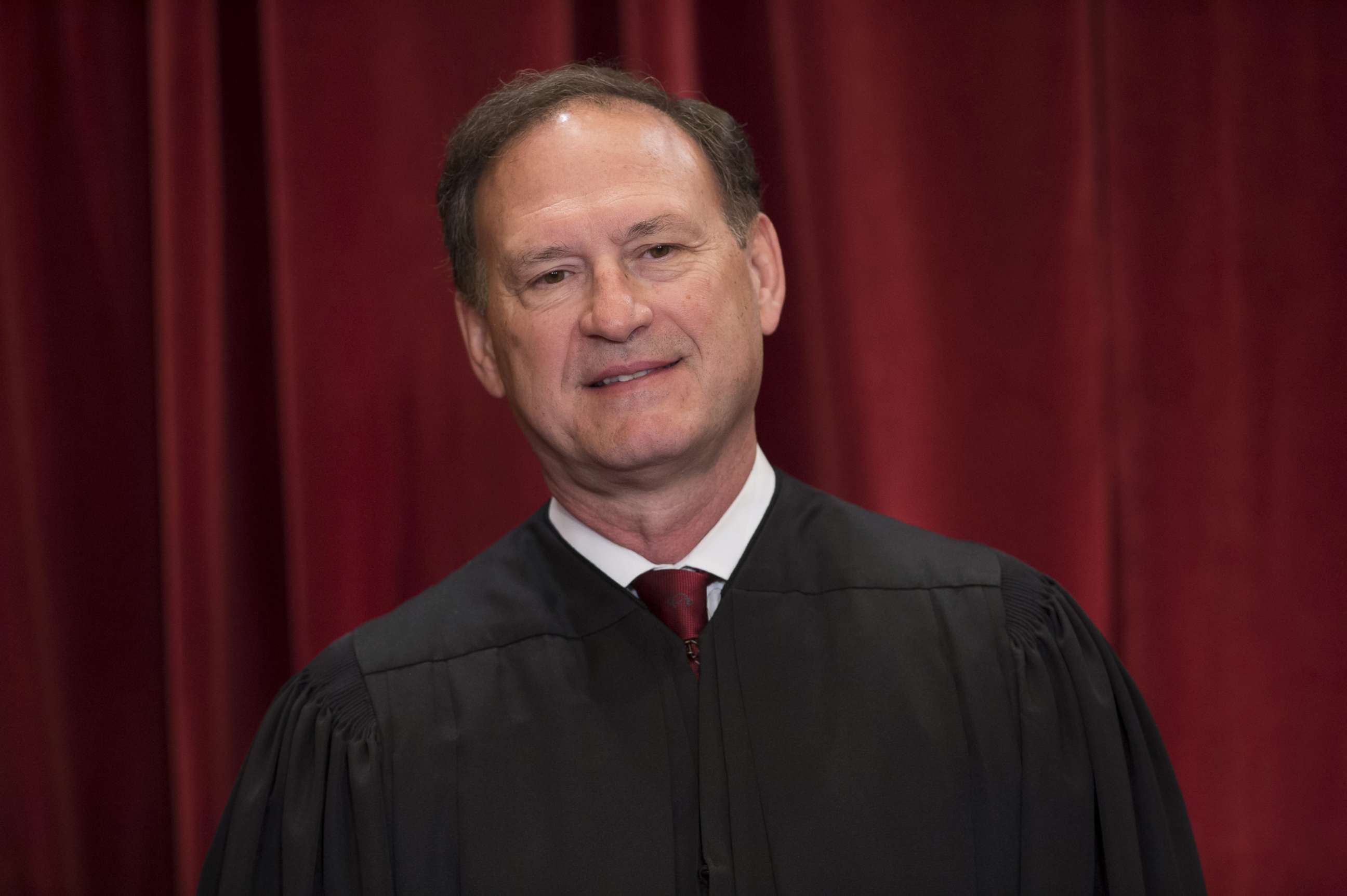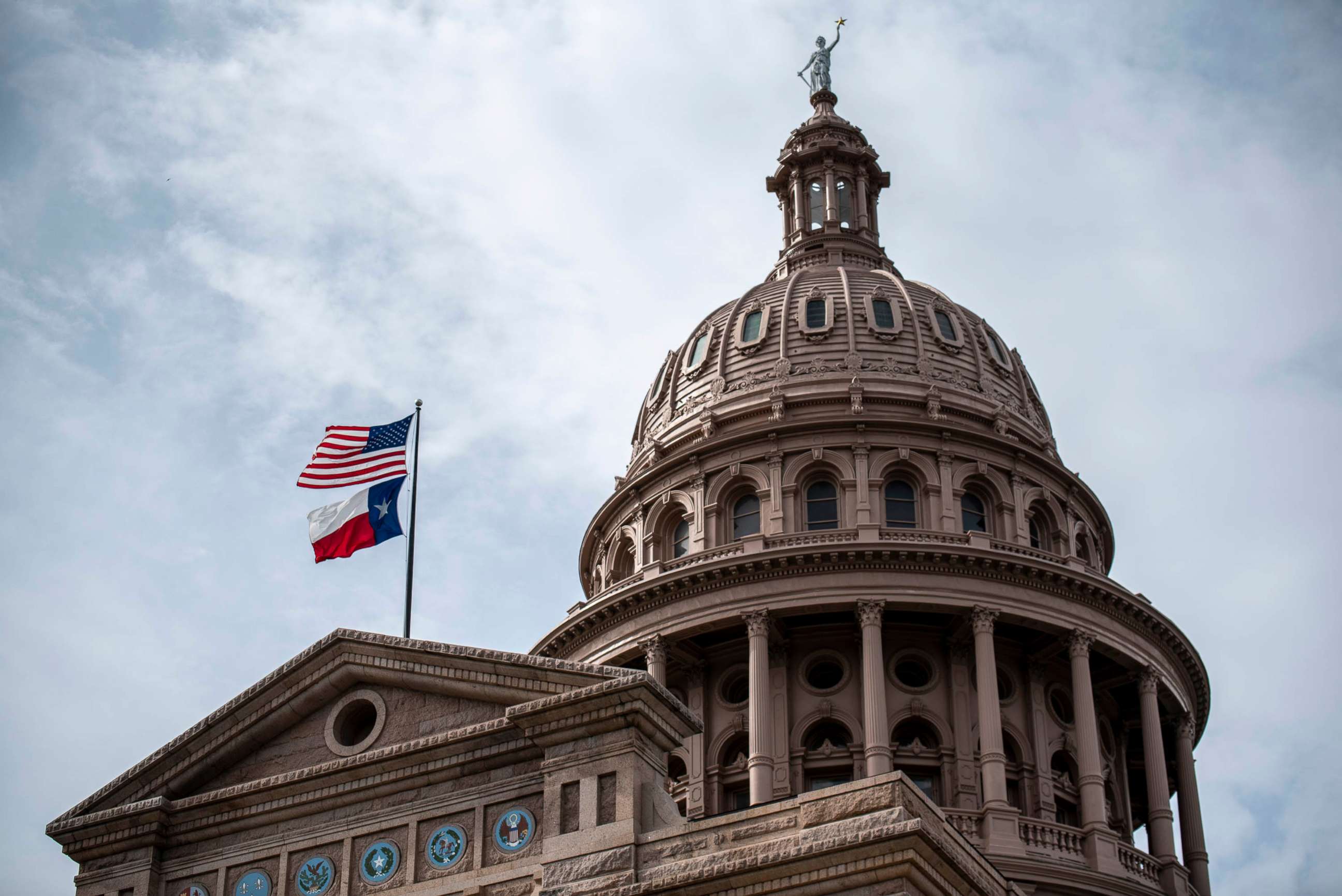When Madelynn Ballenger, 21, found out she was pregnant with her second child last year, she said she was around five weeks into her pregnancy.
Living in Texas, Ballenger said she knew immediately it could be difficult to access abortion care in her home state.
In September, the same month that Ballenger learned of her pregnancy, the state enacted a sweeping abortion law that banned most abortions after six weeks of pregnancy.
The law, Senate Bill 8, says "a physician may not knowingly perform or induce an abortion … if the physician detects a fetal heartbeat," including embryonic cardiac activity, that can be observed as early as six weeks into a pregnancy. Before the law, abortions up to 22 weeks of pregnancy were allowed in Texas, with restrictions.
"I decided I wasn't going to go get an abortion, partially because I just didn't think I could do it, but also because ... I didn't know if I was going to be able to get an appointment in time," Ballenger told ABC News. "There could be a heartbeat by the time I got there."
Ballenger, whose older son was 6-months-old at the time, said she decided to continue with her pregnancy and at the time, also planned to keep the baby.
Around four months into her pregnancy, Ballenger said she and her boyfriend split and she began to think about adoption because she thought her son "deserved better."
"I kind of told myself that it wouldn't be in in the best interest of either of my kids if I kept my second son just because I was a single mom at the time, I didn’t have a job currently at that time," she said. "I just didn’t think it was going to be the easiest route, I guess, and I didn’t want to make my kids suffer because I chose to keep him."
When Ballenger gave birth to her second son, in June 2022, she chose an open adoption, an increasingly common type of adoption in which the birth and adoptive families have contact during and after the adoption process.
In a closed adoption, biological parents do not have direct contact with the adoptive family, who may know little or nothing about the biological family.
'I still have moments where I cry about it or I struggle'
Even with the self-described network of support she had between her family and the adoption agency, Ballenger described the adoption as "probably the hardest thing" she has done.
"Those first two weeks it was just survival, just get through it," she said, noting that she experienced postpartum depression. "I’d say it’s gotten a little easier with time but I still have my bad days. I still have moments where I cry about it or I struggle."
Just a few weeks after Ballenger gave birth, the U.S. Supreme Court overturned Roe v. Wade, removing the constitutional right to abortion that had been the law nationwide for nearly 50 years.
Ballenger said she cried at the decision because of the personal experience she had just been through.
"I felt so bad because now there's going to be just so many more women that don’t have the option to abort so they're going to have to consider the adoption and go through what I went through," Ballenger said. "Not saying abortion is easy either, but ... it's just not easy to go through an adoption at all. Not everybody has that in them, and that's understandable."
Supreme Court ruling puts focus on adoption
Now six months since the court's ruling in Dobbs v. Jackson Women's Health Organization -- after which more than one dozen states ceased nearly all abortion services -- experts predict there will be a shift in the adoption landscape, but it remains to be seen exactly how seismic it may be.
"There is no national tracking for the number of adoptions," said Gretchen Sisson, a sociologist and researchers at the Advancing New Standards in Reproductive Health program at the University of California San Francisco. "We have some sense of how many there are, but as far as how much they have increased since Dobbs, that remains a big question mark."
In the Supreme Court 6-3 ruling overturning the Roe v. Wade decision, Justice Samuel A. Alito Jr., writing the majority opinion, referenced adoption as an option for pregnant women.
"Americans who believe that abortion should be restricted press countervailing arguments about modern developments," Alito wrote, going on to say, “... A woman who puts her newborn up for adoption today has little reason to fear that the baby will not find a suitable home."
In an earlier hearing in the same Dobbs case, Justice Amy Coney Barrett questioned whether adoption, specifically safe haven laws, rather than abortion could resolve the “burdens of parenting” noted in Roe v. Wade and Casey v. Planned Parenthood, the two major Supreme Court rulings on abortion that protect a woman's right to end a pregnancy before fetal viability.
Sisson said her research on abortion and adoption shows that, in reality, there is not a clear line between adoption and abortion as equal options.
"The idea that adoption is going to be an alternative [to abortion], that's not borne out in what we see people already deciding," Sisson said. "That's not what they want for their lives, and their children's lives."
Among women who are denied abortion services, over 90% of them choose to parent versus choosing adoption, according to data from The Turnaway Study, which tracked nearly 1,000 women for five years.
According to Sisson, the data shows that adoption is a "rare decision to make," while abortion is by comparison a "far more common" decision women make.
In 2020, 620,327 abortions were reported in the U.S., according to the Centers for Disease Control and Prevention, which collected data on every state aside from California, Maryland and New Hampshire.
That same year, there were an estimated 19,685 non-stepparent, private domestic adoptions in the U.S., according to the National Council for Adoption, an adoption advocacy organization.
"Adoption is almost always a constraint. It's what happens when people feel they don't have another option, when parenting is so impossible, so untenable, so unsupported, that people will turn to adoption purely as a way of surviving and ensuring their child's well-being," said Sisson. "And if you remove abortion as a legal option, more people will relinquish when they feel that they can't parent."
Sisson estimates that new abortion bans enacted post-Roe will increase the number of infants available to adopt each year by as many as 10,000.
"You're talking about a relatively small number compared to the number of people that are going to be parenting children that they didn't intend to parent," said Sisson. "But you're talking about a massive number when looking at the overall rate of adoption."
Impact in Texas, where abortion is largely prohibited
In Texas -- where abortions are prohibited in nearly all circumstances, including rape and incest, after Roe was overturned -- some adoption providers told ABC News they have seen a slight increase in the number of women inquiring about adoption, but they say it remains too soon to tell the full impact of abortion restrictions.
Mark Melson, president and CEO of the Gladney Center for Adoption, a Texas-based international adoption agency, said the center has seen an increase in adoption inquiries over the last several months, which he noted is also part of an anticipated uptick after a sharp decline during the coronavirus pandemic.
Melson said he believes there will be an increase in domestic infant adoptions over the next several years due to abortion restrictions, but that it will not be a permanent trend.
"We may see this gradual increase in adoptions and adoption choices for a while," he said. "But the anticipation is that they will continue to start back on a gradual decline over time, simply because birth rates are continuing to drop a little bit."
Rory Hall, executive director of Adoption Advocates, another Texas-based adoption agency, said the agency has not yet seen a noticeable increase in women opting for adoption amid heightened abortion restrictions in the state.
She said that while she believes infant adoptions will increase, she does not believe they will increase as much as anticipated because adoption is such a "hard" option.
"Our biology tells us not to do it, and emotionally it's just so hard to do that," Hall said of adoption. "I think most people, if they would terminate the pregnancy but can't, are going to try to find a way to parent."
She continued, "With that said, there's going to be some that are just in a position where they can’t no matter what, and will choose adoption."
Around 55,000 abortions were reported for Texas residents in 2020, according to the state's Health and Human Services Commission.
The same year, the state had around 6,000 domestic adoptions, a total that includes adoptions by stepparents, not just infant adoptions, according to data from the state's Office of Court Administration.
Kenna Hamm, assistant director of the Texas Adoption Center, said she too believes it is "too early to tell" what impact abortion restrictions in Texas have had on women's decisions to choose adoption, noting also that it is hard to directly link the two because so many factors come into play when it comes to choosing adoption.
"Adoption is obviously a very difficult decision that comes with a lot of layers and oftentimes it's simplified, just in general in society or even within the media," said Hamm. "Right now, you see a lot of frustration in the community, where people are forcefully positioning adoption as a substitution for abortion, and so that leaves women feeling dismissed, along with a multitude of other emotions."
All three adoption providers said that while the impact of abortion restrictions on the adoption industry continues to play out, they are equally concerned about the increase in people who may choose to parent, only to potentially struggle later on.
"I think it's going to weigh even more on our foster care system," Hall said of increased abortion restrictions. "My concern is we already have so many kids in [foster] care ... and that will increase probably exponentially as each year goes by, and so I worry about those kids."
Texas had more than 26,000 children in state care last year, according to the state's Department of Family and Protective Services.
"We're already seeing a taxing of a state-supported foster system, not only in Texas, but frankly around the country," said Melson. "And I do have a concern, honestly, that in the next few years, we may certainly see children that, a wonderful person tried to parent the child and simply was not able to do that, unfortunately, and over time, the child may end up in a foster situation."
The emotional toll of adoption
Lucy, a 19-year-old living in Texas, said she knows firsthand the emotional impact of having adoption be seen as the only choice.
When Lucy, who asked that her real name not be used to protect her privacy, found out she was pregnant in April, she said she was already seven months pregnant, far beyond the point of fetal viability that determined abortion access even before Roe was overturned.
Lucy said she was unemployed at the time and decided to move forward with adoption, visiting a local Planned Parenthood clinic to gather information on adoption resources and ultimately choosing a private adoption agency to work with.
"This is a literal human life that I had not planned for a single second before this," Lucy told ABC News, describing her thought process at the time. "I just kept telling myself, 'You didn’t plan this, but you can make everything best life for them. All these decisions will equal what is the best life for them.'"
In mid-July, Lucy gave birth to a daughter. She took part in an open adoption, which she said has allowed her to stay in close touch with her daughter and the adoptive parents.
"I'm fascinated with knowing that there's a part of me out there, and I wouldn’t ever be able to wake up or go to bed at night without knowing that she’s okay and seeing how she's doing," Lucy said. "So I knew that open adoption was probably the only option for me to be happy. And it's been absolutely amazing."
Lucy said that while she made the choice to go through with the adoption, it took a toll on her emotionally, describing the process as "not easy."
'I had an amazing support system, and that's what got me through'
"I've never felt that sad and destroyed in my life," she said of her postpartum experience. "I had an amazing support system, and that's what got me through, but not everybody has that."
Brittany Brennan, of Iowa, and her husband have adopted two children from a Texas-based adoption agency in the past four years.
She described adoption as a "beautiful thing" and one that now has many more options, such as more communication between the birth and adoptive families.
Brennan said adoption is also complicated. She said though she sees adoption as the path in which a child "gets to exist and have a wonderful life," there can also be trauma, as she said there is with abortion too.
"People say, ‘Well just adopt,’ and I always hate that phrase because it’s not that simple," she said. "It's a life-altering decision for the birth mom and it's life-altering for the adoptive family, and I think people say that statement so casually."
Melson, of the Gladney Center for Adoption, said that with a greater spotlight on adoption post-Roe, he would like to see more support offered to families involved in the adoption process, specifically birth moms.
"You're going to carry this amazing child for nine-plus months, and then you're going to choose to place that child with someone else. That's a hard, hard decision," he said. "And society, in many cases, is not overly supportive."
In Texas, the Department of Family and Protective Services offers adoption and post-adoption support primarily to families of children adopted through the agency, according to its website. For women who are pregnant or who have a newborn and are considering adoption, the state's Health and Human Services Commission refers them to private adoption agencies, providing a list online of nearly 50 agencies in the state.
The state also has an Alternatives to Abortion program that offers "support services to pregnant women and their families, adoptive parents, and parents who have experienced miscarriage or the loss of a child," according to the program's website.
"If a woman is making an adoption plan, I think there needs to be support, federal, state, whatever, that comes alongside them and says, 'When you make this plan, we're going to help you and be there for you,' whether that's counseling, whether that's other resources to help her through this time that can be a very difficult time for her," said Melson. "And that does not exist today. If an [private adoption] agency doesn't, there is no direct support for that."



